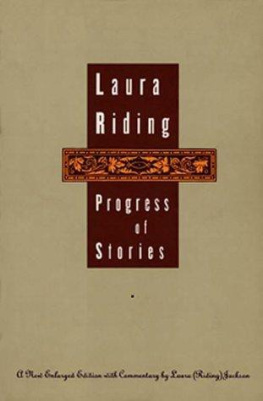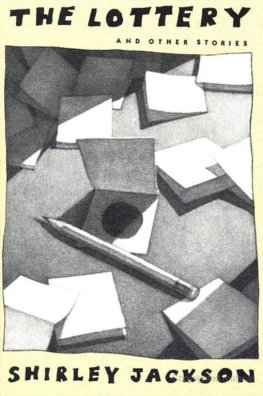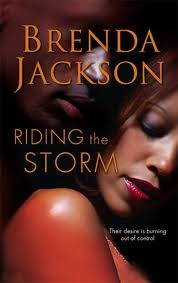Jackson Laura Riding - Progress of Stories
Here you can read online Jackson Laura Riding - Progress of Stories full text of the book (entire story) in english for free. Download pdf and epub, get meaning, cover and reviews about this ebook. year: 1982, publisher: Persea Books, genre: Art. Description of the work, (preface) as well as reviews are available. Best literature library LitArk.com created for fans of good reading and offers a wide selection of genres:
Romance novel
Science fiction
Adventure
Detective
Science
History
Home and family
Prose
Art
Politics
Computer
Non-fiction
Religion
Business
Children
Humor
Choose a favorite category and find really read worthwhile books. Enjoy immersion in the world of imagination, feel the emotions of the characters or learn something new for yourself, make an fascinating discovery.
- Book:Progress of Stories
- Author:
- Publisher:Persea Books
- Genre:
- Year:1982
- Rating:5 / 5
- Favourites:Add to favourites
- Your mark:
- 100
- 1
- 2
- 3
- 4
- 5
Progress of Stories: summary, description and annotation
We offer to read an annotation, description, summary or preface (depends on what the author of the book "Progress of Stories" wrote himself). If you haven't found the necessary information about the book — write in the comments, we will try to find it.
All 18 stories from the 1935 classic collection, plus 13 more, selected and arranged by the author.
Library : General
Universes : A New Enlarged Edition [01]
Formats : EPUB
ISBN : 9780892552030
Progress of Stories — read online for free the complete book (whole text) full work
Below is the text of the book, divided by pages. System saving the place of the last page read, allows you to conveniently read the book "Progress of Stories" online for free, without having to search again every time where you left off. Put a bookmark, and you can go to the page where you finished reading at any time.
Font size:
Interval:
Bookmark:
Laura Riding
PROGRESS OF STORIES
With new material, including other early stories and a new preface by
Laura (Riding) Jackson
Originally published in hardcover in 1982 by The Dial Press. First published in paperback in 1994 by Persea Books.
S OURCES
ANARCHISM IS NOT ENOUGH first published 1928 by Jonathan Cape, London EXPERTS ARE PUZZLED first published 1 by Jonathan Cape, London PROGRESS OF STORIES first published 1935 by The Seizin Press, Deya Majorca and Constable & Co. Ltd, London The story, "Christmastime," first appeared in the Winter 1982 issue of Grandstreet.
To My Friends Barbara and James Mathias
Who know how to read this book Right
Forwards from its early time, Backwards from Now
C ONTENTS
THE STORIES OF THE FIRST EDITION
PREFACE TO THE FIRST EDITION (1935)
I N stories are set down probable truths which are not demonstrably true: stories are guesswork. They are guesswork either because their material is entirely unimportant, so that it bears no more thorough treatment than guesswork; or because their material, although somewhat important, is burdened with unimportant elements which make it unripe, at least for the present, for thorough treatment; or because their material is, as it were, so precociously important that one can do no more than nurse high hopes for ithopes sobered with caution.
The first group of stories in this book deals with unequivocally unimportant material. They are about lives as such; and all lives, as such, are unimportant. All lives have happened long ago; or, at any rate, they are not happening now, however immediate they may seem to the people who are living them. And whatever is not happening now is unimportant; it is merely curious. It is very difficult to let the unimportant remain unimportant; almost impossible for most people who write stories, because it would sadden them to feel that their work on the material did not make it more important. People who write stories are so generous. I too am generous; but I am also economicalI do not believe in wasting generosity. One can get all the sensations of generosity, where it is improvident to be generous, in being fair. With the material of the first group of stories I have been very fair. I have done a certain amount of work on it, but no more than was enough to establish it decently in its unimportance.
Why did I bother at all? Not because the material forced itself on me: material does not force itself on a writer. A storyteller must, like a truth-teller, make discoveries. The only difference between them is that the story-teller must let his discoveries remain obscure, while the truth-teller must make his discoveries plain. I have written these seven stories, then, for the discipline which story-telling lays upon one's truth-telling instincts. My function as a writer is not story-telling but truth- telling: to make things plain. But some of the things that I have already made plain have seemed obscure to people because I have sometimes made too much plainmore than most people are capable of understanding. Which has not only been a waste of my energy but a cause of irritation to the people who have not understood; so that, in revenge, they have called my writing obscure. I do not like to waste my energy or to irritate people or to be called obscure. And so I have really written these stories of lives for the good of everyone. I have set myself the task of discovering very obscure, or irrelevant, material, and done a minimum amount of work on it. I do not mean these seven stories to seem witty or pathetic or ingenious or nave or dull. My only ambition for them was that they should produce a certain relaxation of energy in myself and a certain relaxation of hostility in those who read them with some previous prejudice against my truth-telling technique. I have, so to speak, changed the subject in telling them. Yet not really: there is only one subject, and it is impossible to change it.
Perhaps those who have no familiarity with, or no especial hostility or friendliness toward, my truth-telling activities will call them foolish stories, or idle stories, or ill-written stories. All, certainly, will agree with me that the material is obscure. Yet no one will call me obscureleast of all those who are the first to call me obscure when my material is important, and because their attention is not equal to the requirements. There is nothing that pleases me so much as to have people agree with me, and nothing that wearies me so much as to be made a scapegoat for the incapacity of people to understand what they only pretend to want to know. This frank account of the motivation of the first group of stories will, I hope, disarm any reader who is tempted to look for some metaphysical catch in them because, as stories written by me, they seem suspiciously simple ones. The other stories in the book must be accounted for somewhat differently.
The two stories which compose the second group deal with material of diluted importance; they are dilutions, and because they are dilutions they are stories. They are stories of ideas. Suppose yourself a guest in a house where your hostess is an energetic woman of wide interests. In such a house, in such a universe, there are really no degrees of importance. At table no topic is supposed to be discussed which is not in some way important. Yet, undeniably, everything is discussed; and only a small part of all that is said is truethat is, absolutely important. Your hostess is affectionate as well as energetic. She appreciates your good intentionsshe has made friends of you because of your good intentionsand does not require that every word you say at her table shall be gospel truth. Indeed, to show her confidence in you, she absents herself a good deal from table, and leaves you most of the time to yourselves, to talk as you please, feeling that you will not go very far wrong in what you say, not wrong enough to make her ask herself why you should be friends of hers at all.
Thus most of the conversation which goes on is a mixture. It consists mostly of stories of ideas which you tell one another. What you say has a general air of importance, but any particular detail, if we stopped to examine it, would seem insignificant and beside the point. Yet your minds move in the right direction; we must not expect too much of them, exactly because they are still moving. While they are still moving they may at any moment move backward rather than forward. Your wisdom is on the whole pretty diluted. Your hostess herself, when she talks with you, tries not to be a purist. She too says many things which are merely stories of ideas. And for the moment this kind of conversation will do. For the moment the story of Miss Banquett will do, and the story of Lady Port-Huntlady. Why should they not, since we are such a mixed company? Perhaps there are too many of us, perhaps a little later on there will be fewer of us. At any rate our minds are still moving, and backward as well as forward; the nearest we get to truth at any given moment is, perhaps, only an ideaa dash of truth somewhat flavouring the indeterminate substance of our minds.
You will notice that I speak of 'our' minds, not saying which one of these is mine. For at this stage we are merely a mixed company; I have no right to affirm that my mind is necessarily purer than yours, or that I am necessarily the hostess. We are at the moment all together a mixed company, and that is all there is to it. And our conversation at its most serious consists of stories of ideas, stories like the ones I have told you about Miss Banquett and Lady Port-Huntlady: these are the kind of stories which you, at your most serious, tell me. And it cannot be otherwise with all of us together so.
We all know that in a little while, when there are not quite so many of us, when we are not such a mixed company, we shall be able to talk to one another in a more immediate way. There is much in our conversation that is important, and Miss Banquett and Lady Port-Huntlady do justice to this; but there is much also that is merely curious, and Miss Banquett and Lady Port-Huntlady cannot gainsay this. Miss Banquett and Lady Port-Huntlady belong to a mixed company. Miss Banquett may seem a more poetic, and therefore a more flattering personification of ourselves than Lady Port-Huntlady; but this is only because we shaped her when the conversation was in full swing, and we are still disappointed that it was not going any better. Lady Port-Huntlady suffers from the disadvantage of rising from among us (faded spirit) when the conversation, as an ambitious intimacy between more of us than could possibly last through to the end, has practically worn itself out. We are no longer disappointed; we are indifferent to the obvious failure of the conversation; we know that as we are we can never really say anything absolutely important.
Next pageFont size:
Interval:
Bookmark:
Similar books «Progress of Stories»
Look at similar books to Progress of Stories. We have selected literature similar in name and meaning in the hope of providing readers with more options to find new, interesting, not yet read works.
Discussion, reviews of the book Progress of Stories and just readers' own opinions. Leave your comments, write what you think about the work, its meaning or the main characters. Specify what exactly you liked and what you didn't like, and why you think so.











